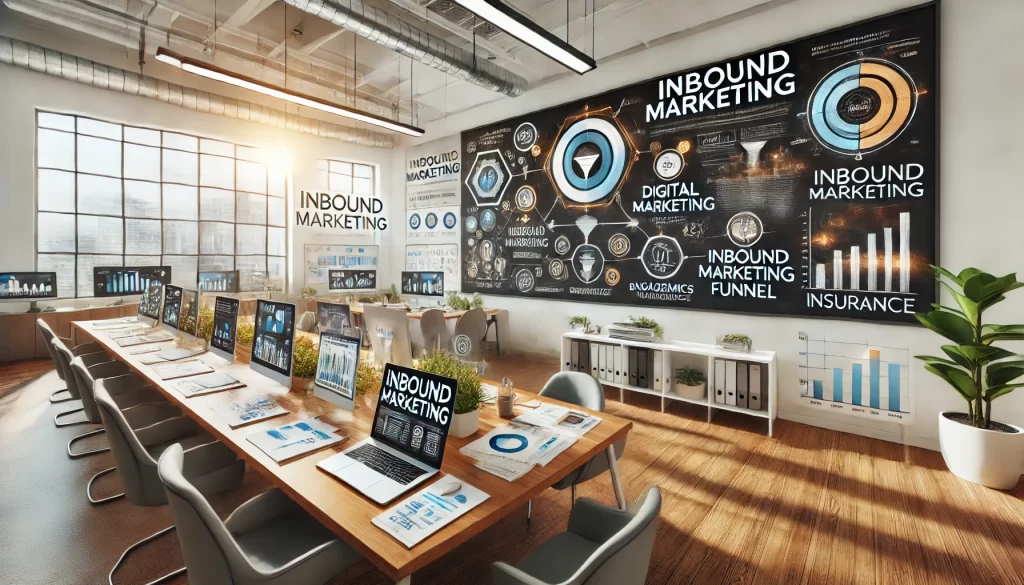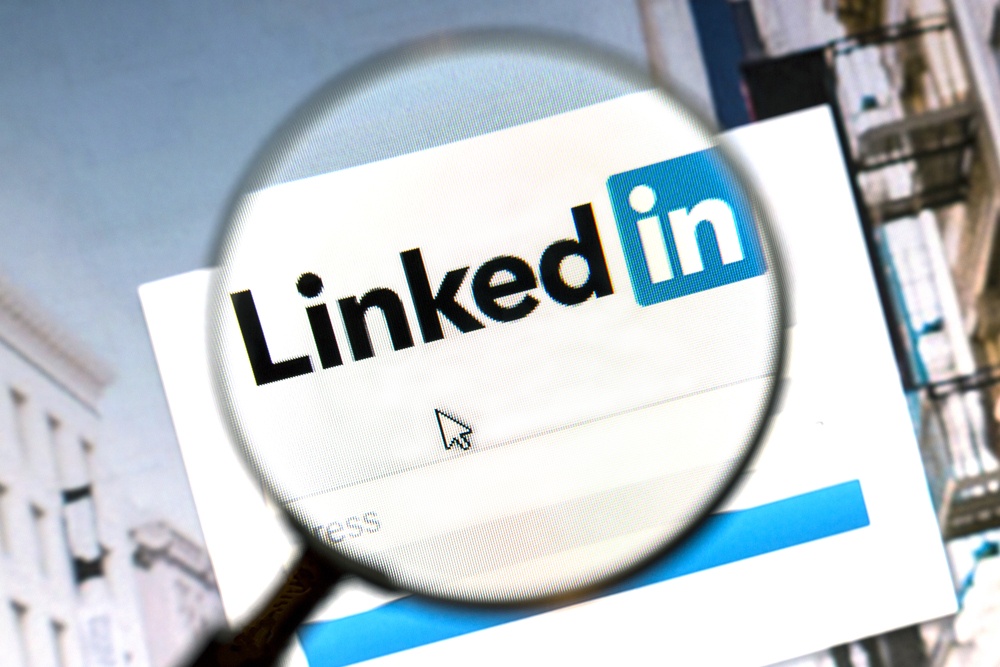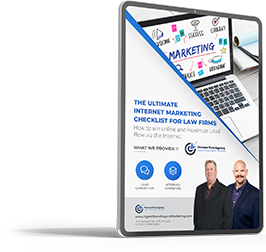What if, instead of chasing leads, you could have potential clients coming directly to you? In today’s competitive insurance landscape, inbound marketing is changing the way agencies attract, engage, and retain clients. By focusing on valuable, informative content, inbound marketing helps build a trusted presence online that naturally draws clients in. Through strategies like content marketing, social media engagement, and search engine optimization (SEO), inbound marketing turns an agency’s website into a lead-generating engine.
Let’s explore the journey of Blue Sky Insurance, a fictional agency, as they adopt inbound marketing techniques to attract more clients and foster long-term relationships. Follow along to discover how each strategy offers a unique benefit, helping insurance agencies work smarter—not harder.
Key Takeaways:
- Inbound Marketing Attracts Clients Naturally: Inbound marketing uses valuable content, social media, and SEO to draw clients in, making it a powerful alternative to traditional outbound strategies like cold calling or paid ads.
- Content Marketing Builds Trust and Credibility: By answering common client questions and addressing their concerns, agencies position themselves as reliable resources, establishing trust and authority in the insurance industry.
- Social Media Creates Connection and Engagement: Social media platforms allow agencies to interact with clients on a personal level, share success stories, and demonstrate expertise, all of which foster stronger relationships and increase visibility.
- SEO Drives Cost-Effective, Organic Traffic: With targeted SEO, insurance agencies can attract local prospects who are actively searching for insurance solutions, bringing in high-quality leads without the ongoing costs of paid ads.
- Email Marketing Nurtures Long-Term Relationships: Personalized email campaigns and newsletters help agencies stay top of mind, delivering relevant information that supports client retention and satisfaction.
- Data-Driven Adjustments Enhance Strategy: Tracking analytics allows agencies to refine their inbound approach, focusing on the strategies that drive engagement and conversions, making inbound marketing an adaptable and efficient tool for sustainable growth.
Understanding Inbound Marketing
Inbound marketing shifts the focus from traditional advertising to a customer-centered approach. Unlike cold calls or billboards, which interrupt people’s day, inbound marketing brings potential clients to you by offering helpful information they’re actively searching for. This strategy meets clients where they are in their buying journey, making it a natural fit for insurance agencies.
For an agency like Blue Sky Insurance, inbound marketing represents an opportunity to be both informative and approachable. Imagine a client searching online for “affordable life insurance” or “first-time homeowner insurance essentials.” With a well-crafted inbound strategy, Blue Sky’s content could be the first to provide answers, naturally positioning the agency as a knowledgeable, trustworthy partner.
Content Marketing for Insurance Agencies
Content marketing lies at the heart of inbound marketing. It involves creating relevant material—blog posts, guides, videos—that address questions and concerns from your audience. For Blue Sky Insurance, this might look like publishing articles titled “5 Tips for Choosing the Right Life Insurance” or “What to Know About Home Insurance as a New Homeowner.” By answering common questions, Blue Sky positions itself as a go-to resource in the industry.
But content marketing is about more than just answers; it’s about building credibility. High-quality content establishes Blue Sky as an expert in areas like life, auto, and home insurance, fostering trust with potential clients who are looking for guidance. Rather than a hard sell, clients see Blue Sky as a helpful consultant, making them more comfortable about reaching out.
Types of Content to Consider
- Blog Posts: Answer specific insurance questions to attract search engine traffic.
- Customer Success Stories: Share real-life scenarios to illustrate how the agency helped clients.
- Infographics: Simplify complex topics, like coverage types, into easy-to-understand visuals.
Content marketing also supports SEO, making it easier for agencies to rank in search results when people look for insurance-related topics.
Social Media Marketing to Engage and Connect
Social media is invaluable for keeping agencies connected with both potential and current clients. For Blue Sky Insurance, platforms like Facebook, LinkedIn, and Instagram allow them to share relevant stories, answer questions, and remind followers of their services without being overly promotional.
Imagine Blue Sky sharing a post about a happy client who found the right home insurance or hosting a Facebook Live Q&A about common insurance myths. Posts like these not only educate but also create a personal connection, helping Blue Sky stay top-of-mind with their audience.
Social media also lends credibility. Reviews, testimonials, and comments from clients serve as “social proof,” reassuring prospective clients. By mixing educational posts, client stories, and timely updates, Blue Sky builds trust in a natural, engaging way.
Leveraging SEO to Drive Organic Traffic
Search engine optimization, or SEO, is key for agencies that want to be easily found online. For Blue Sky Insurance, SEO means strategically targeting keywords that potential clients search for, such as “affordable life insurance in [City]” or “best car insurance for new drivers.” By using these keywords in blog posts, landing pages, and social media, Blue Sky can rank higher in search results, capturing clients who are already interested.
SEO is a cost-effective, long-term strategy. Unlike paid ads, which need constant funding, SEO can keep bringing traffic without additional cost. Local SEO is especially valuable for insurance agencies, helping them attract clients in specific geographic areas. For instance, Blue Sky can use local SEO by claiming their Google My Business profile, gathering client reviews, and maintaining accurate contact information across directories.
The result? More people in their area can discover Blue Sky when they search for insurance solutions, leading to better-quality leads and higher conversion rates.
Nurturing Leads with Email Marketing and Personalized Content
Once prospects have shown interest—such as by signing up for a newsletter—it’s essential to nurture those leads with personalized follow-up content. Email marketing is an effective way to keep in touch and provide more relevant information. For Blue Sky, sending targeted emails based on the client’s needs helps keep their agency top-of-mind.
For example, if a new homeowner joins Blue Sky’s email list, the agency might send emails covering “Home Insurance Essentials” or seasonal reminders like “Winterizing Your Home.” These emails offer timely, valuable information that’s tailored to the client’s life stage.
Educational newsletters also work well for building relationships, offering tips on auto safety, policy changes, or renewal reminders. Every email reinforces Blue Sky’s helpfulness, building trust and loyalty over time.
Benefits of Inbound Marketing for Insurance Agencies
Inbound marketing doesn’t just generate leads—it generates high-quality leads. Here are a few reasons why it’s particularly effective for insurance agencies:
- Cost Efficiency Compared to Outbound: Traditional advertising, like TV or print ads, can be costly. Inbound marketing is often more affordable and sustainable, relying on organic reach.
- Enhanced Trust and Credibility: By prioritizing education and value, inbound marketing helps agencies build trust with clients over time.
- Better Client Retention and Satisfaction: Inbound marketing isn’t only about gaining new clients; it also helps maintain relationships with existing clients through valuable ongoing communication.
- Higher Quality Leads: Inbound marketing naturally attracts prospects who are looking for information, so they’re often more interested and prepared to buy.
Tracking Success and Making Adjustments
Tracking inbound marketing efforts is crucial to success. Using analytics tools like Google Analytics or social media insights, agencies can track engagement, traffic, and conversions. For Blue Sky Insurance, analyzing which topics or social posts drive the most engagement helps refine their strategy to better meet audience interests.
With data-driven adjustments, Blue Sky can adapt its efforts for improved results. If a specific keyword generates high-quality leads, they can focus on creating more content around that topic. This flexibility makes inbound marketing a dynamic strategy that can be optimized over time.
Conclusion
Inbound marketing offers a client-focused way for insurance agencies to grow. By creating valuable content, engaging on social media, optimizing SEO, and nurturing leads, agencies can build strong, lasting connections with clients. Like Blue Sky Insurance, any agency can leverage inbound marketing to attract quality leads and increase retention—ultimately building a more sustainable business.
Ready to make inbound marketing work for your agency? Schedule a strategy session with Agent Branding and Marketing today, and let’s explore how to transform your agency’s digital approach, driving growth and long-term success.
FAQs
What is inbound marketing, and how does it differ from outbound marketing?
Inbound marketing is a strategy focused on attracting clients by providing valuable, helpful content that addresses their needs and questions. Unlike outbound marketing, which uses methods like cold calling or paid ads that reach out to customers directly, inbound marketing encourages clients to come to you by positioning your agency as a trusted resource.
Why is content marketing important for insurance agencies?
Content marketing helps insurance agencies build credibility and trust by educating potential clients on topics they’re interested in, like choosing the right insurance policy. By providing answers and insights through blog posts, guides, and infographics, agencies can establish themselves as knowledgeable industry experts, which fosters trust and encourages clients to engage.
How does social media benefit an insurance agency’s inbound marketing strategy?
Social media platforms allow agencies to connect with clients on a more personal level by sharing helpful tips, answering questions, and posting client success stories. This engagement builds familiarity and trust, making it more likely that potential clients will consider the agency when they’re ready to purchase insurance.
What is SEO, and why is it valuable for insurance agencies?
SEO, or search engine optimization, involves optimizing online content with keywords to improve a website’s visibility in search engine results. For insurance agencies, this means being discoverable by people actively searching for services like “affordable life insurance” or “home insurance in [City],” which helps attract high-quality leads without ongoing advertising costs.
How can email marketing nurture leads for an insurance agency?
Email marketing allows agencies to stay connected with prospective and existing clients by sending personalized information based on their interests or life stages. Regular newsletters or targeted email campaigns help keep the agency top of mind, providing value that enhances client retention and satisfaction.
How can insurance agencies track the success of their inbound marketing efforts?
Agencies can use analytics tools, like Google Analytics or social media insights, to track key performance indicators such as website traffic, engagement rates, and conversion rates. This data helps refine and improve inbound marketing strategies over time, ensuring the agency’s efforts remain efficient and effective.
What are the main benefits of inbound marketing for insurance agencies?
Inbound marketing is cost-effective and brings in high-quality leads by reaching people actively searching for information. It also builds client trust, supports long-term relationships, and enhances retention rates, helping agencies grow sustainably.
This article is a collaboration between Carl Willis and OpenAI’s ChatGPT. Created on October 30, 2024, it combines AI-generated draft material with Willis’s expert revision and oversight, ensuring accuracy and relevance while addressing any AI limitations.






